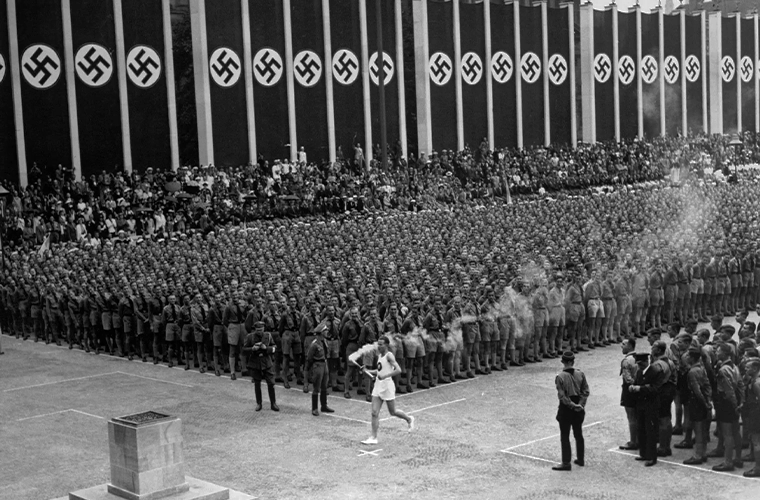In the sweltering summer of 1936, Berlin played host to the Summer Olympics, thrusting Nazi Germany onto the global stage while stealthily offering a masterclass in “sportswashing.”
Adolf Hitler, two years removed from becoming the Third Reich’s absolute ruler, used the 1936 Olympic Games to project a facade of a peaceful and progressive Germany while covertly attempting to portray Aryan athletes as symbols of racial superiority.
While the world marveled at the athletic prowess, few realized the event was a meticulously crafted propaganda piece. Under the direction of Reich Minister of Propaganda Joseph Goebbels, the Nazi regime had temporarily removed all apparent signs of Jewish persecution. Strict censorship was imposed on the German press, with official directives dictating how the athletic competitions would be covered.
In a secret directive issued on August 3, 1936, Goebbels’ Reich Press Chamber instructed the German media that despite its overtly racist doctrines, “The racial point of view should not be used in any way in reporting sports results” and “above all” African Americans should not be insensitively discussed in public broadcasts.
The entire spectacle was carefully orchestrated to mask the sinister reality that Nazi Germany was a fascist regime built on extreme nationalism, militarism, and racism.
However, sadly, the Nazi’s psychological weaponization of the 1936 Summer Olympics was highly effective. Many were shocked when, just three years later, the Wehrmacht invaded Poland, initiating World War II. The result would be the deadliest conflict in human history, claiming the lives of 75 million people, including 20 million military personnel and 40 million civilians.
This historical instance epitomizes “sportswashing,” a practice of using sporting events or teams to improve a country’s reputation, often to deflect attention from human rights abuses, political repression, or other controversies.
According to ongoing research by Dr. Vitaly Kazakov of the University of Manchester’s School of Environment, Education, and Development, despite growing awareness of its underlying issues, sportswashing remains prevalent and highly effective in the modern era.
At the international level, the term sportswashing refers to the use of sporting events to improve tarnished reputations, often of nations with poor human rights records, autocratic governments, or controversial policies.
By hosting prestigious sporting events to project “soft power,” nations aim to distract from their harmful actions and present a positive image to the global audience. This tactic has evolved over decades, with numerous examples demonstrating its effectiveness.
Sportswashing has become increasingly visible in recent years as the world has become more interconnected through the Internet and social media.
The 2022 FIFA World Cup in Qatar is a prime example. Despite promises of improved labor conditions and environmental sustainability, the event was marred by reports of migrant worker abuses and human rights violations. The gleaming stadiums and the thrilling matches could not entirely obscure the underlying issues, yet the global spectacle largely succeeded in shifting the narrative away from these concerns.
Similarly, due to concerns over human rights violations by China, including the systematic oppression of the Uyghurs, ten nations, including the United States, Canada, and Australia, imposed diplomatic boycotts on the 2022 Winter Olympics hosted in Beijing. According to U.S. intelligence reports published by the New York Times, China requested Russia delay its invasion of Ukraine until after the Olympics to avoid tarnishing the Games’ public image.
The Kremlin would ultimately launch its full-scale invasion of Ukraine four days after the Games closing ceremony. Chinese officials have since denied claims of having prior knowledge of Russia’s intentions, calling it “speculations without any basis, and intended to blame-shift and smear China.”
These are just a few examples of sports being used to display a veneer of modernity and hospitality juxtaposed with the behind-the-scenes realities of political maneuvering and social control.
In a two-part series published by the U.K. Arts and Humanities Research Council, Dr. Kazakov explains that sportswashing operates through several mechanisms. Primarily, it leverages sports’ global appeal to generate positive media coverage and public goodwill.
Sporting events attract extensive media attention, providing host nations with a platform to showcase their culture and achievements. These events often overshadow critical narratives.
It’s important to note the phenomenon is not limited to autocratic regimes and external projections. Democracies likewise engage in sportswashing, targeting domestic audiences to foster national pride and unity.
Beginning at the height of the U.S. wars in Afghanistan and Iraq, the NFL partnered with the Department of Defense (DoD) to launch its “Salute to Service” initiative, which integrates the professional football league with several military support programs. Similarly, Major League Baseball (MLB) and the NBA have programs incorporating military support with professional athletics.
That’s not to say that professional sports providing advocacy for the military or veterans organizations is necessarily a bad thing. It’s certainly far removed from the more egregious examples of sportswashing, like the 2014 Men’s Ice Hockey World Championships in Belarus or the 2014 Winter Olympics in Sochi, Russia.
Nevertheless, programs like the NFL’s Salute to Service offer clear examples of how sports can be co-opted to garner support for inherently unconnected institutions like national security and politics.
According to Dr. Kazakov, aside from distraction, sportswashing can involve deliberately crafting narratives that portray the host nation favorably. This can include highlighting infrastructural advancements, cultural festivities, and the successful execution of large-scale events. However, the reality often involves significant disinformation and obfuscation of the truth.
Disinformation is often a core element of sportswashing. Host nations can disseminate propaganda that promotes their political goals and counters unfavorable perceptions by controlling the narrative around a sporting event, just like Goebbels orchestrated in the 1936 Olympics.
Some recent examples include Saudi Arabia’s investment in high-profile sports, including the acquisition of England’s Newcastle United F.C. and recent partnerships with World Wrestling Entertainment (WWE). These efforts are designed to improve the kingdom’s international image amid ongoing criticisms of its human rights record and political repression.
The strategic use of sports to disseminate favorable narratives resembles a modern-day Potemkin village, where the facade of progress and openness conceals underlying truths. This tactic can significantly influence domestic and international public opinion, creating a contradiction between perceived and actual realities.
Dr. Kazakov’s current research has focused on studying sportswashing in Iceland, a nation that found itself in the global spotlight during the Euro 2016 and 2018 World Cup tournaments.
In a release by the University of Manchester, Dr. Kazakov said interviews with Icelandic fans, journalists, and sports administrators have so far revealed a complex picture of how people interpret sportswashing.
Early findings have shown that people are often aware of the concerns involving the host nations of major international sporting events and tend to deeply care about human rights. However, the “feel-good” factor accompanying sporting events typically overshadows any critical issues.
Dr. Kazakov said this effect was notably observed during the 2018 World Cup in Russia, where many Icelandic fans traveled to Russia for the first time because their team participated in the tournament. Despite being exposed to years of critical domestic coverage regarding the Kremlin’s aggressive foreign policies and political persecution, Dr. Kazakov said most Icelanders reported having a good impression of Russia following their attendance at the tournament.
The results show that people are increasingly aware of nations using athletic competition for ulterior motives. However, sports’ powerful emotional impact can diminish the potency of negative reports, suggesting the practice of sportswashing remains as effective today as it was in 1936.
The discussions about modern information warfare are often dominated by topics such as internet-fueled misinformation, disinformation, and political influence campaigns. However, Dr. Kazakov warns that the less scrutinized practice of sportswashing can significantly impact global public opinion.
“Few other platforms have a truly global reach and serve as powerful emotional response prompts in the same way as major sporting events. They are an influential domain in which the public interacts with important political and social issues,” Dr. Kazakov writes. “Yet sports are still instinctively and commonly linked to the misleading idea that they remain entirely outside of politics.”
Dr. Kazakov says that combating sportswashing requires a multifaceted approach. Greater transparency and accountability in the awarding and execution of sporting events are essential. International sports organizations like the International Olympic Committee must enforce stricter human rights and ethical standards for host nations.
Additionally, sustained investigative journalism and public awareness campaigns are needed to help uncover the realities behind the glossy images projected during these events.
The public can also play a crucial role by staying informed and questioning the narratives presented to better understand the intersections between sports and politics.
For now, research indicates that despite growing recognition of its manipulative nature, sportswashing remains an effective strategy for regimes seeking to divert attention from contentious issues. Just as Nazi Germany used the 1936 Olympics to obscure its genocidal aims, modern regimes continue to employ this tactic to enhance their international image.
“Sportswashing is a catchy term, but it is not a new phenomenon – sport has been used for political and social goals for centuries,” Dr. Kazakov added. “Ultimately, we need to be figuring out how to channel the power of sport in productive ways.”
Tim McMillan is a retired law enforcement executive, investigative reporter and co-founder of The Debrief. His writing typically focuses on defense, national security, the Intelligence Community and topics related to psychology. You can follow Tim on Twitter: @LtTimMcMillan. Tim can be reached by email: tim@thedebrief.org or through encrypted email: LtTimMcMillan@protonmail.com

